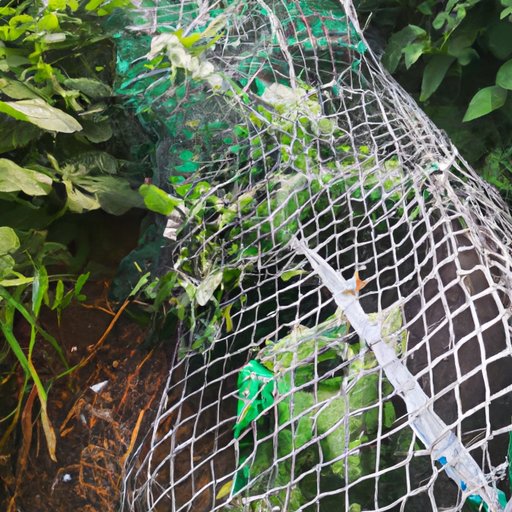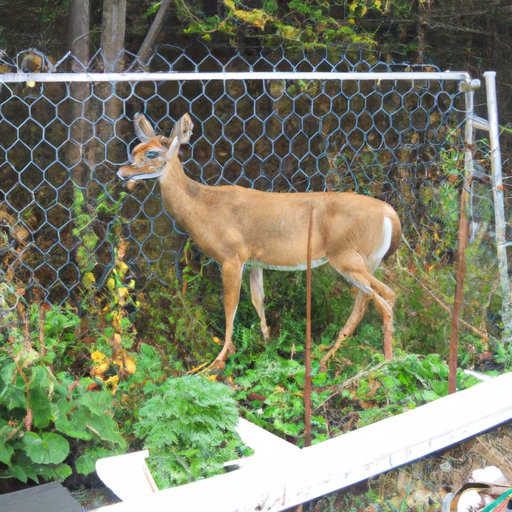Introduction
Many people encounter problems with deer eating their plants. Whether it’s a vegetable garden, flower bed, or lawn, deer can cause a lot of damage if they are not kept away from the plants. Luckily, there are several solutions that can be used to keep deer away from plants naturally.
Plant Deer-Resistant Plants in Your Garden
One solution for keeping deer away from plants is to plant deer-resistant plants in your garden. There are some plants that deer generally avoid due to their smell, taste, and texture. Examples of these plants include lavender, marigolds, petunias, chives, and daffodils. Not only will these plants help to keep deer away, but they also provide beauty to your garden.
When choosing plants for your garden, look for those that are labeled as “deer-resistant”. This will help ensure that you are selecting plants that deer are less likely to eat. Additionally, research the plants before you purchase them to make sure they will thrive in your climate and soil type. Also, consider planting a variety of plants to make your garden more attractive to deer.
Use Commercial Deer Repellents or Homemade Deer Repellent Recipes
Another solution for keeping deer away from plants is to use commercial deer repellents or homemade deer repellent recipes. Commercial deer repellents are products designed to repel deer from an area. These products typically contain ingredients that have a strong scent or taste that deer find unpleasant. Examples of common ingredients include garlic, peppermint, and ammonia.
Benefits of using commercial deer repellents include ease of use and convenience. Most products come in ready-to-use containers and can be applied directly to the plants. Additionally, many products are long-lasting, so you won’t need to reapply them as often. When using commercial deer repellents, be sure to follow the directions on the label carefully.
If you would prefer to make your own deer repellent, there are several recipes available online. These recipes typically involve combining ingredients like hot sauce, vinegar, and essential oils. Benefits of using homemade deer repellent recipes include cost savings and the ability to customize the ingredients. When making your own deer repellent, be sure to use high-quality ingredients and follow the recipe closely.
Install Motion-Activated Sprinklers
Motion-activated sprinklers are a great way to keep deer away from plants. These devices are designed to detect movement and spray water when triggered. The sudden sound and sensation of water can startle deer, causing them to flee the area.
Benefits of installing motion-activated sprinklers include low maintenance and cost-effectiveness. Most sprinklers are easy to install and require minimal upkeep. Additionally, these devices are relatively inexpensive compared to other deterrents. When using motion-activated sprinklers, be sure to place them in areas where deer are likely to be present.

Create Physical Barriers such as Fences and Netting Around Vulnerable Plants
Creating physical barriers around vulnerable plants is another effective way to keep deer away. Fences and netting are two common types of physical barriers that can be used. Fences should be at least 8 feet tall and made of materials that deer cannot easily jump over or break through. Netting should be placed over plants to prevent deer from reaching them.
Benefits of creating physical barriers include reliability and effectiveness. These barriers are highly effective at deterring deer and can be used in combination with other methods. Additionally, fences and netting can be customized to fit the size and shape of your garden. When using physical barriers, be sure to check them regularly for signs of damage or wear.
Utilize Natural Predators Such as Coyotes, Foxes, and Owls to Keep Deer Away
Finally, another solution for keeping deer away from plants is to utilize natural predators. Coyotes, foxes, and owls are all natural predators of deer, and their presence can help deter deer from entering an area. To attract these animals to your garden, you can set up feeders and nesting boxes.
Benefits of utilizing natural predators include safety and environmental friendliness. These animals will not harm humans or pets and do not pose any danger. Additionally, natural predators are an eco-friendly solution that does not require the use of chemicals or other artificial deterrents. When using natural predators, be sure to check local laws to ensure you are legally allowed to do so.
Conclusion
In summary, there are several solutions for keeping deer away from plants naturally. These solutions include planting deer-resistant plants, using commercial or homemade deer repellents, installing motion-activated sprinklers, creating physical barriers, and utilizing natural predators. While each solution has its own pros and cons, they can all be used in combination to effectively keep deer away from plants.
(Note: Is this article not meeting your expectations? Do you have knowledge or insights to share? Unlock new opportunities and expand your reach by joining our authors team. Click Registration to join us and share your expertise with our readers.)
